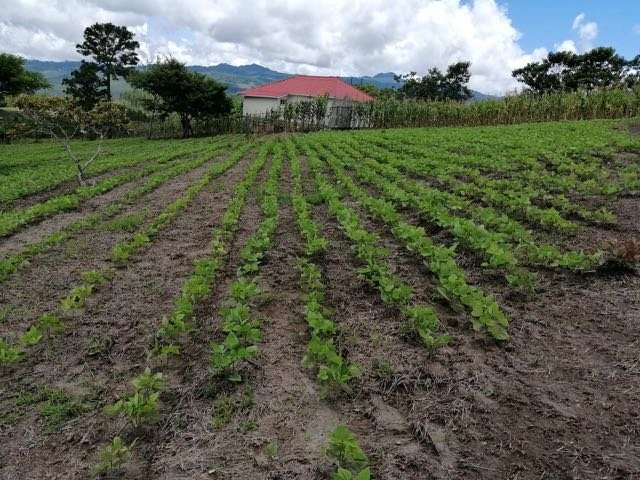Break up your fallow ground
We now return to the theme of returning. After observing the word return 8 or more times in chapter 3, chapter 4 opens with a conditional promise from God. Verses 1 and 2, feature returning to the Lord along with the prerequisites for this return.
“If you return, O Israel, declares the Lord, to me you should return. If you remove your detestable things from my presence, and do not waver, and if you swear, ‘As the Lord lives’ in truth, in justice, and in righteousness, then nations shall bless themselves in Him and in Him they shall glory’”
Before we can bask in the joy of an invitation to return to the Lord, the people of Judah must take heed to the word if.
If #1
If you return. Return to what? Return to who? God says… “to me you should to return”. We are not returning to the blessing of God. We are returning the warmth, intimacy, and exclusivity of our relationship to Him. Understanding this is critical. Think back to the disturbing and graphic images of an unfaithful wife who has behaved like a prostitute. It’s one thing for her to want to return home for the benefit of the roof over her head, or food on the table. It’s another for her to long for her husband. To desire Him anew and pledge faithfulness to him again. To truly return is to want to go back to a relationship with God, not to the benefits He graciously affords us. Surely this requires demonstrating godly repentance not worldly sorrow.
If #2
If you remove your detestable things from my presence, and do not waver. This takes us back to the purging of idols and places of idol worship that took place in the days of King Josiah. We find this account in II Kings 23:1-20. It seemed that this reform was either a) short-lived b) insufficient. Perhaps Josiah got rid of public places of idol worship, but people still had their private stash of idols at home. All of chapter 10 will presents with evidence of ongoing idolatry. Even if they did not physically have carved wooden idols or metal statues, they still practiced idolatry in their heart. And we often do the same. This cannot be. Our hearts must singularly worship Christ. Without wavering. Without looking back to our former idols.
If #3
If you swear ‘As the Lord lives’ in truth, in justice, in righteousness… This condition has to do with daily conduct. It’s not about swearing that God lives or professing belief in God’s existence, although all creatures must and will profess this reality. This statement about ‘swearing’ has to do with honesty and integrity in business dealings and interpersonal relationships. In truth. This has to do with dishonest scales. In justice. Not oppressing the fatherless and the widow, as God indicted His people in Malachi 3:5. In righteousness. When you make an oath, follow through on it. James 5:12. In context, this would seem to apply to making oaths about repenting and returning to God. Retracing the prayer at the end of chapter 3 supports this view. If we promise that we repent and desire to return to God, let it be so. Not in pretense. But in truth.
“The reason we are weak and ineffective in the Christian life is that we want to plant the flowers of heaven in the same pot with the weeds of the world. It is not so much that we are against Christ as it is that we want to follow Christ and the world at the same time. ”
At the conclusion of verses 1 and 2 with these three conditional if statements, we see God’s imperative statement. If then…
“Break up your fallow ground, and sow not among thorns.”
Breaking up the ground involves the hard labor of plowing. The Hebrew phrase seems to refer to untilled ground, or soil that is newly cultivated. Hosea, written earlier than Jeremiah, to the Northern Kingdom, employs that same phase in 10:12: Sow for yourselves righteousness; reap steadfast love; break up your fallow ground, for it is time that you seek the LORD, that He may come and rain righteousness on you.
Notice in this passage that the obedience preceeds the restorative blessing that comes with repentance. Note again, that repentance is not about return for the sake of the blessing, but rather repentance is about it being fine time that we seek the LORD.
The expression that the Spirit of Christ used as He inspired Jeremiah is seen again in the Parable of the Sower, and its subsequent explanation by Christ incarnate. Looking at Matthew’s account of Christ’s explanation of the parable in chapter 13, verses 18-23, we see both the fallow ground and the sowing among thorns bits interpreted for us.
As for what was sown on rocky ground, this is the one who hears the work and immediately receives it with joy, yet he has no root in himself, but endures for a while, and when tribulation or persecution arises on account of the word, immediately he falls away.
This would certainly seem to apply to the disappearing devotion of both Israel and Judah. As soon as the honeymoon was over, they wandered off looking for other lovers.
The second imperative that Jeremiah uses is sow not among thorns. Here’s what Christ says: As for what was sown among thorns, this is the one who hears the word, but the cares of the world and the deceitfulness of riches choke the word, and it proves unfruitful.
But Christ’s aim, in speaking to us in Jeremiah and the parable of the sower would seem to be what He says in Matthew 10:23: As for what was sown on good soil, this is the one who hears the word and understands it. He indeed bears fruit and yields, in one case a hundredfold, in another sixty, and in another thirty.
Application: If we return to Him, if we remove the detestable things of idolatry from before Him, if we do not swear falsely and we listen to His word, He will bring forth fruit in our lives. The fruit of what? The fruit of repentance.
There is one more imperative, found in verse 4, that warrants much study, and much preaching that I will leave you with. Some other time, we can connect this poignant command to Paul’s letter to Galatians churches and to the New Covenant fulfillment in Christ Jesus.
“Circumcise yourselves to the LORD, remove the foreskins of your hearts, O men of Judah and inhabitants of Jerusalem.”

